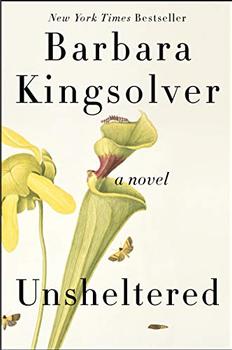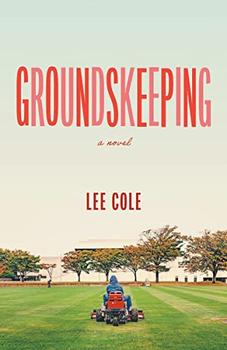Summary | Excerpt | Reading Guide | Discuss | Reviews | Beyond the book | Read-Alikes | Genres & Themes | Author Bio

A Novel
by Barbara KingsolverWilla Knox's house is falling down. She recently inherited a Victorian residence in Vineland, New Jersey, and moved there with her husband Iano, a Greek-American political science professor. With them are their 26-year-old daughter, Antigone ("Tig"), who is a restaurant worker recently returned from Cuba, and Iano's ill father, Nick. A contractor tells Willa the house is beyond saving even if they did have money for repairs, and as the year progresses ceilings start caving in. But her family is also falling apart in metaphorical ways. Willa, in her mid-50s, is a veteran journalist, but after the magazine she edited folds she fears her career may be over. Early on she gets a call from her son Zeke, whose partner has just committed suicide, leaving him the single father of a several-week-old son. As Zeke tries to rebuild his life, baby Dusty joins Willa's ragtag household.
Nearly 150 years before, in the early 1870s, a house on this very plot is also falling down. It is the home of Thatcher Greenwood, who moves in with his bride Rose and her mother and sister. The structure that Rose's father built is crumbling already, and there is no money to shore it up. Thatcher's career as the new science teacher founders almost before it starts, too, with Principal Cutler undermining him at every turn and trying to force him to publicly deny Charles Darwin's principles. The only relief Thatcher can find from his troubled family and work life is at his neighbor Mary Treat's house. Mary (one of the book's handful of historical figures – see Beyond the Book) writes up her experiments on spiders and Venus flytraps for scientific journals and is in correspondence with Darwin himself.
The stories collide when Willa starts investigating her neighborhood's past at the Historical Society. The book's structure also emphasizes similarities between two time periods that might initially appear very different. Chapters alternate between the story lines, and the last words of one chapter form the title of the next. Kingsolver carries this all the way through the book: take a peek at the last page and you'll see that the final words are the title of Chapter 1. It's a clever and elegant connecting strategy, as is the habit of using variations on the title word as frequently as possible – something Jonathan Franzen also does in his novels. (I counted 22 instances of "shelter" and its variants in the text; how many can you spot?)
There are also strong thematic links between the eras. In the wake of the Civil War, America remained divided: "One in five of our young men died … and we are still riven, north against south, countryman against immigrant, laborer against lord," as Cutler puts it. In the novel's recreation of 2016, immigration and economic inequality are still huge concerns. Willa's racist father-in-law, Nick, blames illegal immigrants for all of the country's problems. Meanwhile, the family is barely getting by on Iano's nontenured academic salary and Willa's freelancing. They have to enroll in Medicare to get Nick's health problems treated. Through Tig's descriptions, Kingsolver presents Cuba as a utopian alternative to how things work in the USA: access to free health care and higher education are a given, carpooling is mandatory, and, thanks to the deprivation of the embargo years, people don't treat everything as disposable.
Kingsolver is nothing if not heavy-handed with her messages: Thatcher and Mary Treat are enlightened scientists who value all of life, as opposed to the selfish, superstitious masses; the American health insurance system is byzantine and socialism would solve it; owning your own home and looking after your own family are not the be-all and end-all. Although Donald Trump is never named, he's clearly the outrageous "Bullhorn" figure, likened to real-life Captain Landis, the tyrannical creator/leader of Vineland in the 1870s. The danger is that readers who are ideologically opposed to Kingsolver may be annoyed by her overt taking of sides, while those who already agree with her could be impatient with what seem like statements of the obvious. I felt Willa's conversations with Tig, a model of the future-minded human, were particularly unrealistic idea dumps.
All the same, Unsheltered is a rich, rewarding novel with so much going on that it feels like it encompasses all of human life: Willa's grief for her dead mother; the shifts in her marriage over time; the unexpected joy of her grandson becoming part of their everyday life; facing an uncertain future in which cooperation and creative cutting of consumption may be the only means of survival. In both time periods we see how suspicion and fear divide people and incite authoritarian leadership. We feel how precarious life can be without a safety net. It's not a subtle book, but it's an important one for our time, with many issues worth pondering and discussing.
![]() This review was originally published in The BookBrowse Review in October 2018, and has been updated for the
October 2019 edition.
Click here to go to this issue.
This review was originally published in The BookBrowse Review in October 2018, and has been updated for the
October 2019 edition.
Click here to go to this issue.

If you liked Unsheltered, try these:

by Daniel Mason
Published 2024
A sweeping novel about a single house in the woods of New England, told through the lives of those who inhabit it across the centuries—a daring, moving tale of memory and fate from the Pulitzer Prize finalist and author of The Piano Tuner and The Winter Soldier.

by Lee Cole
Published 2023
An indelible love story about two very different people navigating the entanglements of class and identity and coming of age in an America coming apart at the seams - this is "an extraordinary debut about the ties that bind families together and tear them apart across generations" (Ann Patchett, best-selling author of The Dutch House).
Not doing more than the average is what keeps the average down.
Click Here to find out who said this, as well as discovering other famous literary quotes!
Your guide toexceptional books
BookBrowse seeks out and recommends the best in contemporary fiction and nonfiction—books that not only engage and entertain but also deepen our understanding of ourselves and the world around us.